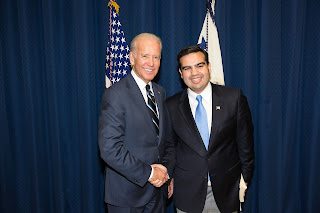1. UAW, WGA, SAG-Aftra strikes
2023 was a historically positive year for labor. Workers won vital gains at the federal policy level and across the private sector. As a result of this worker advocacy, unionization has grown and become more popular. As a result of further unionization, workers have seen notable wage and benefit improvements.
Nowhere was this worker power more publicized this year than in the saga of striking United Auto Workers (UAW), SAG-AFTRA, and WGA workers. Overwhelmingly, especially with regard to the auto workers, the public supported these striking workers. President Biden, who publicly supported these strikes, made the historic first visit of a sitting president to a picket line when he stood with UAW strikers. Even historically pro-managememt Republican Party politicians were loath to criticize the workers. They claimed solidarity with the workers as they used it as a way to (albeit deceptively, in my humble opinion) attack Biden’s environmental policies. But the big picture takeaway was remarkable: both major political parties and the vast majority of the American public at least *wanted to* be perceived as sympathetic with the workers.
That is a remarkable social development. Just a decade ago, President Obama’s pro-labor moves, though woefully insufficient, were the subject of routine attacks from his GOP rivals. Today, the political tide winds have shifted in favor of labor. A stronger economy for workers, where employers are competing for workers rather than the other way around, is ultimately best for everyone.
The gains this year made by labor are also significant as the National Labor Relations Board made it easier to unionize and to hold employers accountable for anti-union activities. At the specific level of UAW and WGA and SAG-AFTRA, these workers secured historic pay increases, better schedules, and more robust benefits. Their livelihoods will be richer because of it. The country is happy for it as well.
2. Taking on junk fees
A prevailing anti-corporate mindset from the public was also on display in the hatred of junk fees. This issue gained prominence after the Ticketmaster Taylor Swift tickets debacle online. The Biden administration has now taken several steps to rein in junk fees and to provide more transparency around company fees.
It’s hard to find anyone out there willing to defend these onerous, ridiculous fees. It is an easy issue we have come together on but for good reason. The baseline prices for so many goods and services are already so expensive. These companies, with record profits, don’t need to gobble up even more money. If anything, it turns off people from them. Consumer protection is a vital element of an economy where everyone is valued. The public overwhelmingly agrees.
3. Taylor Swift
Taylor Swift was Time’s Person of the Year for 2023 and it is not hard to see why. Swift is an international pop culture sensation. A hugely popular figure, Swift has firmly earned herself a place among music titans like The Beatles and The Rolling Stones. Her concerts in the Eras Tour broke all kinds of records and even boosted local economies. Her romance with Travis Kelce also continues to be a source of public fixation. Swift’s talents and charms continue to bring all kinds of people together in joy.
4. Barbenheimer
The dual release of “Barbie” and “Oppenheimer” in July was not only a smash box office success but it was also a significant cultural moment of the year. There were so many memes, fascinating takes, and discussions of which movie to see first as part of possible double features. These films also helped bring millions back to the theaters after COVID wreaked havoc on the movies. So little in media brings us together as part of a shared, collective experience. But Barbenheimer was a fleeting moment of millions experiencing monumental movies at the same time in a joyous way.
5. Pandas
Everyone loves pandas. Therefore, people were quite upset when it was announced late in 2023 that the Chinese government was reclaiming pandas from zoos in Washington, D.C. and Atlanta. Panda diplomacy is a very real thing with its origins dating back to President Nixon’s initial thawing of relations with China. The videos too of pandas rolling around at the Smithsonian National Zoo are just so adorable. They are some of the most wholesome content online.
I personally have enjoyed seeing pandas in person at the National Zoo and I was disappointed at this news too. Then, President Biden and Chinese President Xi Jinping met in San Francisco in November as part of an effort to improve relations. In the aftermath of it all, President Xi announced that “we are ready to continue our cooperation with the United States on panda conservation, and do our best to meet the wishes of the Californians so as to deepen the friendly ties between our two peoples.” Indeed, this means pandas may be coming back to San Diego (a wonderful zoo I visited in February) and so we may not be pandaless in the U.S. after all. People rejoiced at this news — and it was even depicted in a “Saturday Night Live” cold open this season — as we love a reason to celebrate cuteness in an often dark world.






